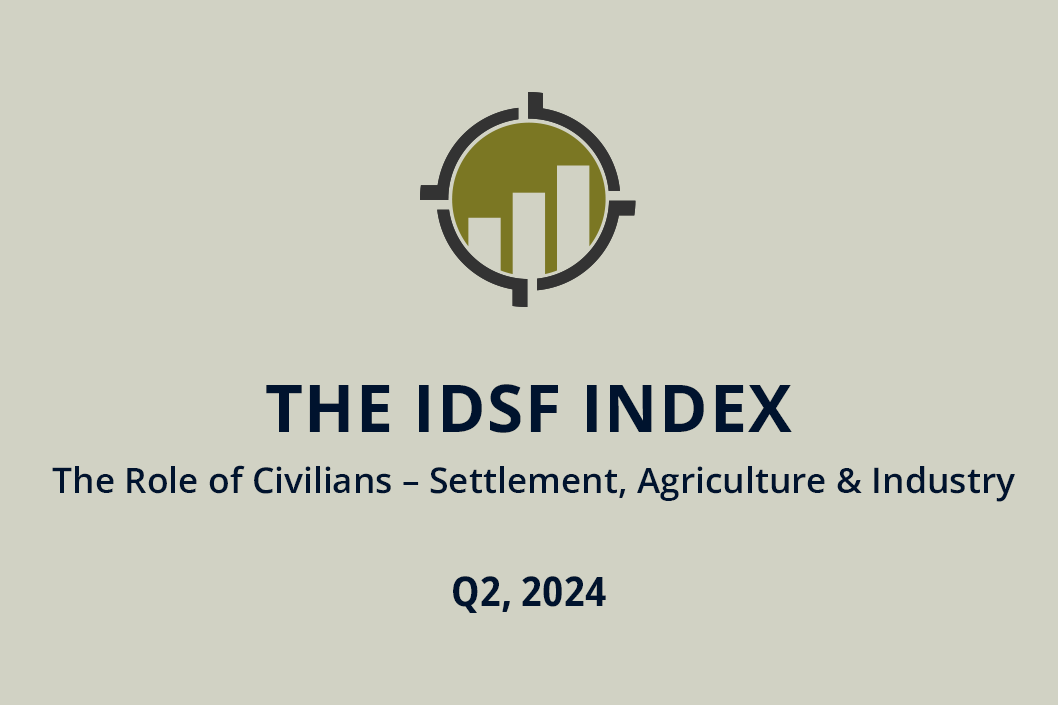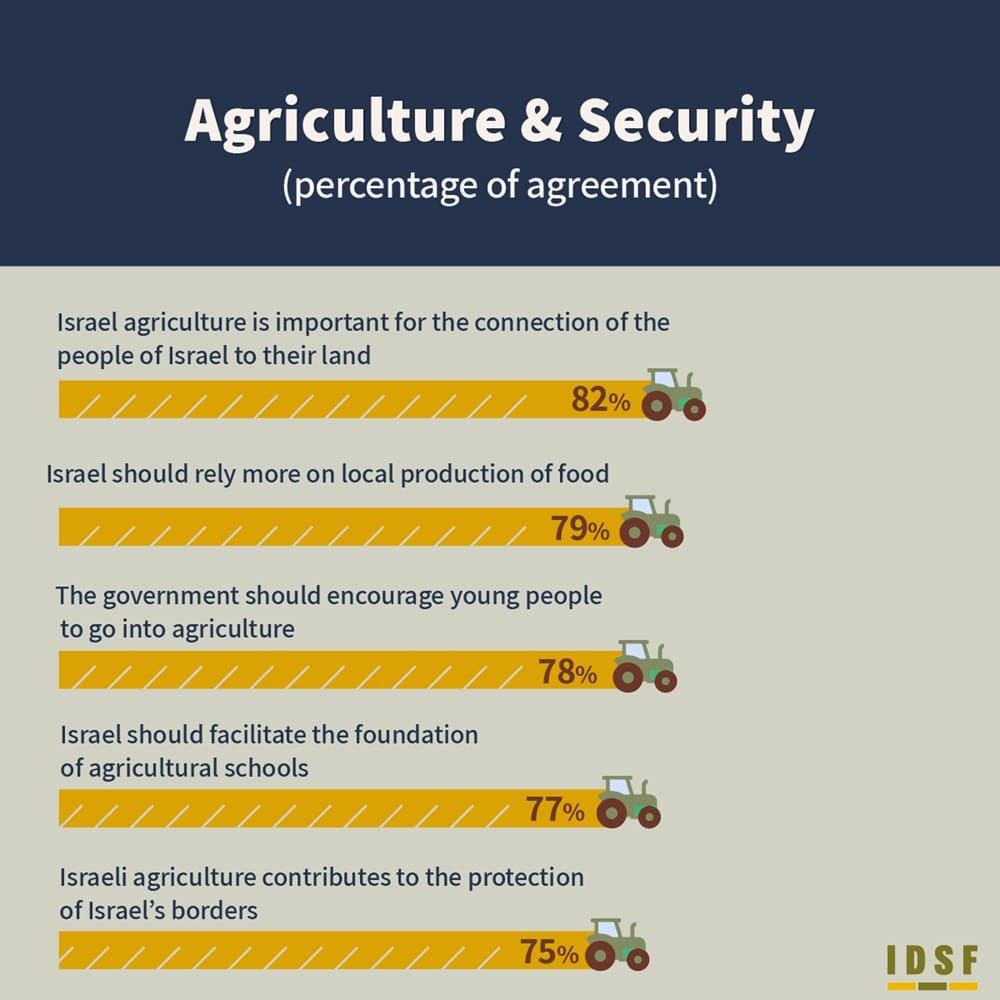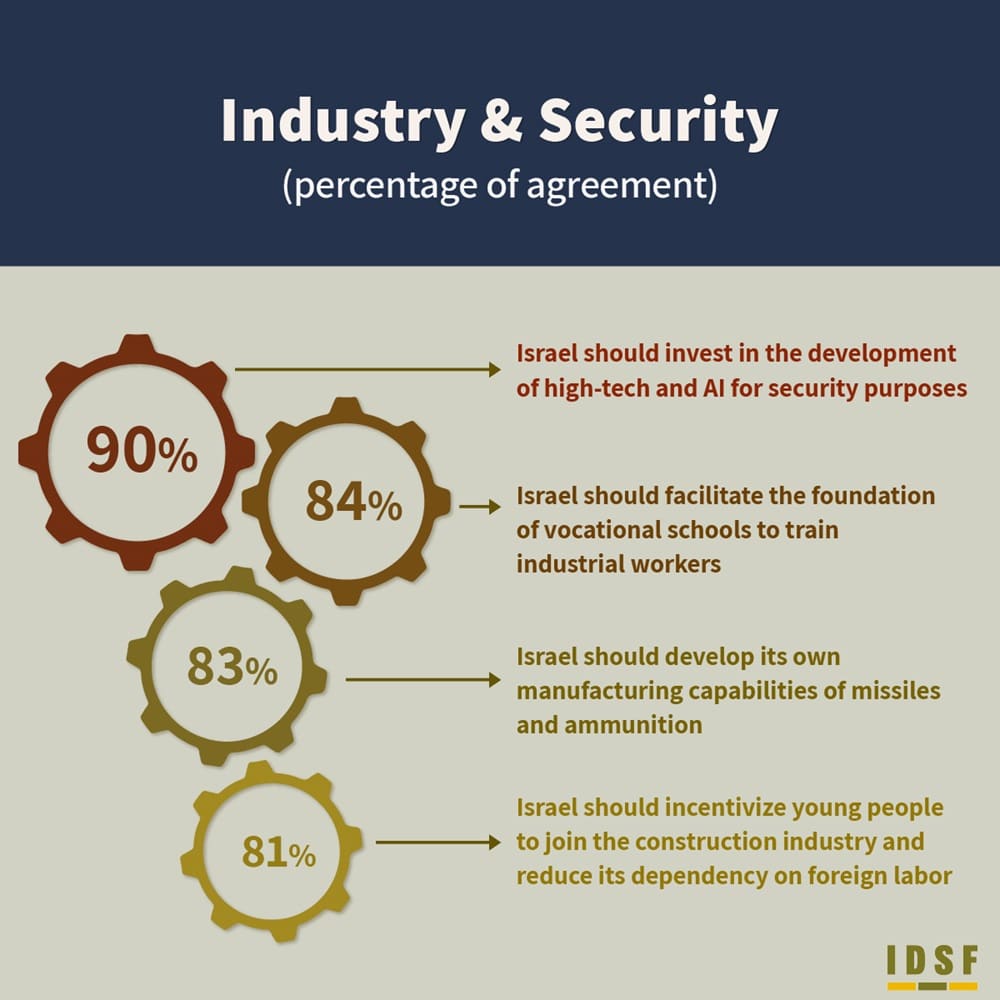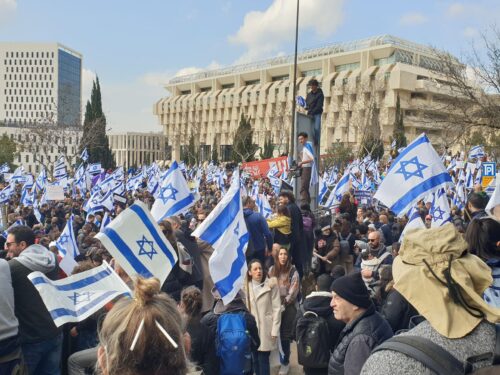
As part of the IDSF HaBithonistim Index project, an ongoing survey of Israeli society on questions of security, military and society, this month’s report explores an issue that has become the focus of attention in Israel following the events of October 7: the role of Israel’s civilians in the country’s national security strategy.
In the next reports, we continue to review the survey findings and the insights they offer. Whereas the previous report focused on public opinion in regards to the civilian role in national security in times of quiet and at war, and explored the public’s opinion on expanding the compulsory military service to the ultra-orthodox (Haredi) community and the role of the youth in the country’s security, the present report deals with public opinion on the contribution of settlement, agriculture and industry to Israel’s national security strategy.
The survey was conducted on May 2024, under the statistical direction of Dr. Hagai Elyakim. It included 1,453 participants from Israel’s internet-using adult population (18+) and was sampled in a manner that ensured its representativeness in terms of age, gender, nationality, religion and political affiliation.
For the combined sample (1,453 respondents), the maximum margin of error is ±2.6% with a 95% probability; For the Jewish sample (1,079 respondents), the maximum margin of sampling error is ±3% with a 95% probability; For the Arab sample (374 respondents), the maximum margin of error is ±5.1% with a probability of 95%.
Instrumental or detrimental? Jewish settlement in Judea and Samaria, Gaza and in border areas
The participants were posed with a series of questions that explore their opinions on Jewish settlement along the borders of the country and the border envelope communities and the extent of the contribution thereof to national security. On the question whether settlement along the country’s borders contributes to boosting national security – 70% of all the respondents and 83% of the Jewish respondents replied affirmatively. An ideological segmentation reveals a considerable variance: 92% of the respondents on the right of the political map thought that settlement along and in the border areas of the country contributes to the security of the Israel; in the center – 72% and the political left – 65%.
The respondents were then asked whether the Jewish settlement in Judea and Samaria contributes to the national security. 53% of all the respondents and 65% of the Jewish respondents replied positively. The distribution by political ideology shows even a larger variance than the previous question, with 88% of the right-wing respondents believing this to be true, as oppose to 42% in the center and only 17% in the left.
The participants were further asked if they thought that the Jewish settlement of Judea and Samaria contributes to the security of the Tel-Aviv metropolis area in central Israel. 58% of the respondents replied positively as compared with 70% of the Jewish respondents.
The issue of the Jewish settlement within the Gaza Strip was also explored: the results show that 49% of the respondents and 58% of the Jewish respondents believe that Jewish settlement of the Gaza Strip will boost the security of Israel’s southern communities. An ideological segmentation shows variance among the political ideology groups: on the right of the political map, 81% of the respondents thought this was true; in the center 32% supported this statement and on the left – only 14%.
As part of the section exploring opinions on Jewish settlement in Israel, the participants were asked whether Israel should arm Jewish communities situated along conflict lines. 85% of all participants answered affirmatively, yet a segmentation by ethnic group shows a large variance with 95% of the Jewish respondents feeling that the government should arm conflict-line communities as oppose to 57% of the Arab respondents.
All colors of the rainbow: broad support of agriculture
The survey also explored the public’s opinion of the extent to which the agricultural sector contributes to national security.
The results show that Israeli-Jews see a strong correlation between agriculture, Israel’s independence and the protection of their country: 82% of all the respondents feel that Israeli agriculture is vital for the connection between the people of Israel and their land; 79% thought that Israel should reduce its dependence on imports and increase local production of food; 75% believe that agriculture is vital for the protection of the country. Similarly, 78% of the respondents noted that Israel should encourage young people to choose a career in agriculture and 77% thought that the country should facilitate the foundation of agricultural vocational schools.
The various statements yielded similar variances among right-wing, center and left-wing respondents, but a distribution according to nationality shows marked differences. Apparently, 86% of the Jewish respondents believe that agriculture connects people to their land, as oppose to 63% of the Arab-Israeli respondents. Furthermore, 83% of the Jewish respondents thought that agriculture contributes to the protection of the country’s borders, as oppose to 53% of the Arab-Israeli respondents.
From vocational schools to high-tech: the contribution of Israeli industry to the country’s security
Lastly, the survey explored the Israeli public’s opinion on Israeli industry and its contribution to Israel’s national security. Industry, similarly to agriculture, received high support rates: 90% of all the respondents believe that Israel should invest in the development of high-tech and AI technologies for security purposes, with 83% maintaining that the country should develop self-manufacturing of missiles and ammunition.
It is likely that the high rates of support for the development of technology and industry are a direct outcome of the Gaza war. This war has revealed just how much Israel’s dependance on the import of munitions from other countries is an encumbrance. It seems that the public now understands that Israel must aspire for independence in terms of development and production as well.
Similarly, it seems that the public understands that a stepping stone to such independence is the cultivation of professional, skilled manpower. The results show that 84% of all the respondents maintain that the country should encourage the foundation of vocational schools for the training of industrial workers. 81% think that the country should encourage young people to pursue a career in the construction industry to reduce its dependance on foreign workers. Interestingly, support for the foundation of more vocational schools and encouragement of young people to choose a career in the construction sector was almost equal between the Jewish and Arab respondents, thus it would appear that this is an interest that serves both demographics.
Security is much more than an army: conclusions
The present IDSF HaBithonistim index aims to explore the extent to which the country’s civilian population could contribute to Israel’s security, with the understanding that security involves many areas of life, aside from military aspects. To create a broad perspective, three main civil sectors that may have an impact on national security were examined: settlement, agriculture and industry.
Following the October 7 disaster, it seems that Israeli public realizes that Israel must reduce its dependence on other countries. For this end – the public mostly agrees – Israel should boost its agriculture, industry and construction sectors and establish the means to provide the manpower to do so.
On the topic of settlement – there is a noticeable perceptional change in Israel’s society. Despite disputes on political matters, is seems that most of the Jewish public supports Jewish settlement across the country – particularly in Gaza and the Judea and Samaria region – and views this as an inseparable component of Israel’ national security strategy.
“The idea of incorporating Israel’s civilians in the military effort might seem unnatural and even jarring to some, however, Israel’ security reality deems this a necessary marriage”, says Brigadier General (res.) Amir Avivi, Chairman of the IDSF HaBithonistim movement. “It’s important to understand that this approach is not new. The founding fathers of Israel’s Labor party in the State’s formative years – led by Ben Gurion – understood the importance of Jewish settlement across Israel. Similarly, it was clear to the leaders of the young state that the presence of the Israeli farmer plays a material role in establishing the country’s borders and sovereignty. As regards to industry – this, too, is a matter that was discussed years ago. In the past, the State of Israel had invested considerably in civil and security industry, with the understanding that the less the country depends on foreign aid the more independent it would be. However, over the years the country has been departing from that perception and Israel’s industry became increasingly dependent on import. The present war in Gaza has made it all too clear that Israel must strive to develop self-manufacturing – particularly of weapons and defense systems. The public has come to fully understand this and now the State’s decision-makers must as well and act accordingly”









